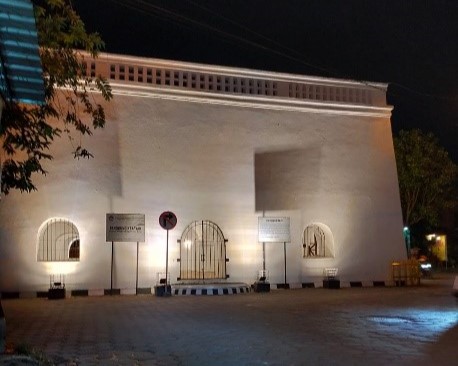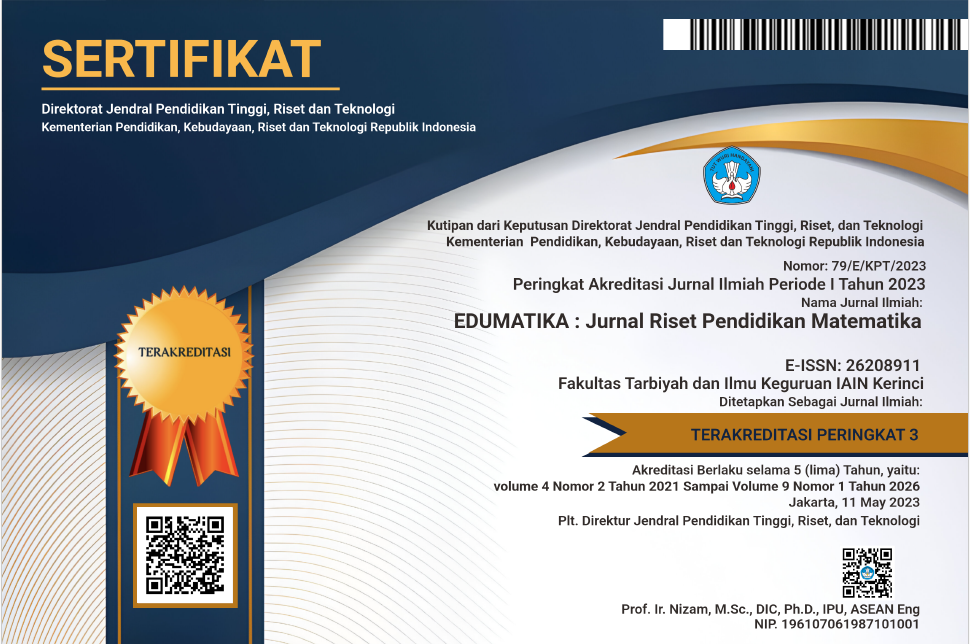Unveiling Mathematics Concepts on Panggung Krapyak and Rotiban Activities: An Ethnomathematics Study in Yogyakarta
Abstract
The utilization of cultural context in mathematics learning can be an alternative of effective learning approach to bridge students to master the abstract dimension of mathematics through the real context in students' lives. However, cultural integration in mathematics learning must begin with the identification of mathematical concepts contained in cultural objects that are relevant to school mathematics. This study aims to identify mathematical concepts contained in the Panggung Krapyak and Rotiban activities at one of the Islamic boarding schools in Yogyakarta, Indonesia. This study is an exploratory study with a qualitative approach. Data were collected through observations of the Panggung Krapyak and Rotiban activities, in-depth interviews with figures, documentation, and literature reviews. The results of the study indicate that Panggung Krapyak displays various mathematical concepts such as reflection, similarity, and congruence in the shape of the building. In addition, the Rotiban activity contains the concept of multiples of numbers in its schedule and cyclic permutation in the cycle pattern of participants sitting. These findings indicate that the existence of mathematical concepts contained in local culture is in line with school mathematics so it can be integrated into mathematics learning to be more contextual and easier for students understanding.
Downloads
References
Amri, S. (2018). Pengaruh kepercayaan diri (self confidence) berbasis ekstrakurikuler pramuka terhadap prestasi belajar matematika siswa sma negeri 6 kota bengkulu. Jurnal Pendidikan Matematika Raflesia, 3(2), 156–168. https://doi.org/10.31186/jpmr.v3i2.6309
Ashabulabib, A., & Suparni. (2022). Kebudayaan desa wisata liyangan pada materi bangun ruang kurikulum merdeka. Jurnal Polynom, 2, 99–109.
Bakhrodin, B., Istiqomah, U., & Abdullah, A. A. (2019). Identifikasi etnomatematika pada masjid mataram kotagede yogyakarta. Jurnal Ilmiah Soulmath : Jurnal Edukasi Pendidikan Matematika, 7(2), 113–124. https://doi.org/10.25139/smj.v7i2.1921
Cahyono, A. E. Y. (2017). Pengembangan perangkat pembelajaran problem-based learning berorientasi pada kemampuan berpikir kreatif dan inisiatif siswa. PYTHAGORAS: Jurnal Pendidikan Matematika, 12(1), 1–11. https://doi.org/10.21831/pg.v12i1.14052
Fatmahanik, U. (2019, March). Pembelajaran matematika dalam kebudayaan Reog Ponorogo (Kajian ethnomathematics). In Proceeding: International Conference on Islamic Studies (ICIS) IAIN Ponorogo (pp. 285-299). https://prosiding.iainponorogo.ac.id/index.php/icis/article/view/20/20
Fauzi, A., & Lu’luilmaknun, U. (2019). Etnomatematika pada permainan dengklaq sebagai media pembelajaran matematika. AKSIOMA: Jurnal Program Studi Pendidikan Matematika, 8(3), 408. https://doi.org/10.24127/ajpm.v8i3.2303
Fonataba, Y., Kho, R., Napitupulu, B., Wahyudi, I., & Lumbantobing, H. (2023). Ethnomathematics at tifa yapen as a source for learning mathematics. Hipotenusa: Journal of Mathematical Society, 5(2), 132–146. https://doi.org/10.18326/hipotenusa.v5i2.536
Gumilang, R., & Nurcholis, A. (2018). Peran pondok pesantren dalam pembentukan karakter santri. Jurnal Comm-Edu, 1(Peran Pondok Pesantren Dalam Pembentukan Karakter Santri), 105–114. https://doi.org/10.22460/comm-edu.v1i3.2113
Hasanah, A. P. (2021). Pengembangan Modul Pembelajaran Berbasis Etnomatematika Pada Materi Bangun Ruang Kelas V Untuk Meningkatkan Motivasi Belajar Siswa SD (Thesis, Universitas Muhammadiyah Mataram). https://repository.ummat.ac.id/2341/
Hasibuan, H. A., & Hasanah, R. U. (2022). The 2D geometry concepts at Al-Mashun Great Mosque: An ethnomathematics exploration. Edumatika : Jurnal Riset Pendidikan Matematika, 5(1), 46–58. https://doi.org/10.32939/ejrpm.v5i1.1248
Husna, N. M. (2024, February). Pembelajaran berbasis etnomatematika untuk meningkatkan prestasi belajar ditinjau dari perolehan hasil belajar siswa. In PRISMA, Prosiding Seminar Nasional Matematika (pp. 442–448). https://proceeding.unnes.ac.id/prisma/article/download/2986/2449/7307
Irawati, E. (2018). Peran Pondok Pesantren dalam Pembentukan Akhlak Santri di Pondok Pesantren Baitulkirom Desa Mulyosari Kecamatan Tanjungsari (Thesis, IAIN Metro). https://repository.metrouniv.ac.id/id/eprint/2847/1/SKRIPSI%20BAB%20I%20SAMPAI%20V.pdf
Jayanti, L. D., Susilawati, W., T Tutut Widiastuti, A., & Nuraida, I. (2022, July). Student problems in mathematics learning in solving mathematical problems. In Gunung Djati Conference Series (Vol. 12, pp. 101-105). https://conferences.uinsgd.ac.id/index.php/gdcs/article/view/723
Kuswidi, I., Lestari, D. F., Arfinanti, N., & Azka, R. (2021). Eksplorasi etnomatematika pada permainan tradisional layangan: Pemahaman materi bangun datar layang-layang dan pengembangan karakter. Jurnal Pengembangan Pembelajaran Matematika, 3(2), 129–137. https://doi.org/10.14421/jppm.2021.32.129-137
Muhartini, M., Mansur, A., & Bakar, A. (2023). Pembelajaran kontekstual dan pembelajaran problem based learning. Lencana: Jurnal Inovasi Ilmu Pendidikan, 1(1), 66-77. https://ejurnal.politeknikpratama.ac.id/index.php/Lencana/article/view/881
Risjord, Mark (2006). Ethnography and Culture. In Stephen P. Turner & Mark W. Risjord, Handbook of Philosophy of Anthropology and Sociology. Boston: Elsevier. pp. 399 - 428. https://philpapers.org/rec/RISPOA
Nur, A. S., Sukestiyarno, Y. L., & Junaedi, I. (2019). Etnomatematika dalam perspektif problematika pembelajaran matematika: Tantangan pada siswa indigenous. In Prosiding Seminar Nasional Pascasarjana Universitas Negeri Semarang (Vol. 2, No. 1, pp. 90-96). https://proceeding.unnes.ac.id/snpasca/article/download/252/212/1045
Siagian, M. D. (2016). Kemampuan koneksi matematik dalam pembelajaran matematika. MES: Journal of Matematics Education and Science2, 2(1), 58–67. https://doi.org/10.30743/mes.v2i1.117
Stebbins, R. A. (2001). Exploratory research in the social sciences. SAGE Publications, Inc., https://doi.org/10.4135/9781412984249
Syafe’i, I. (2015). Pondok pesanteren: lembaga pendidikan pembentukan karakter. Al-Tadzkiyyah: Jurnal Pendidikan Islam, 8, 85–103. https://doi.org/10.24042/atjpi.v8i1.2097

Copyright (c) 2024 Adib Ashabulabib, Nurul Arfinanti

This work is licensed under a Creative Commons Attribution 4.0 International License.














